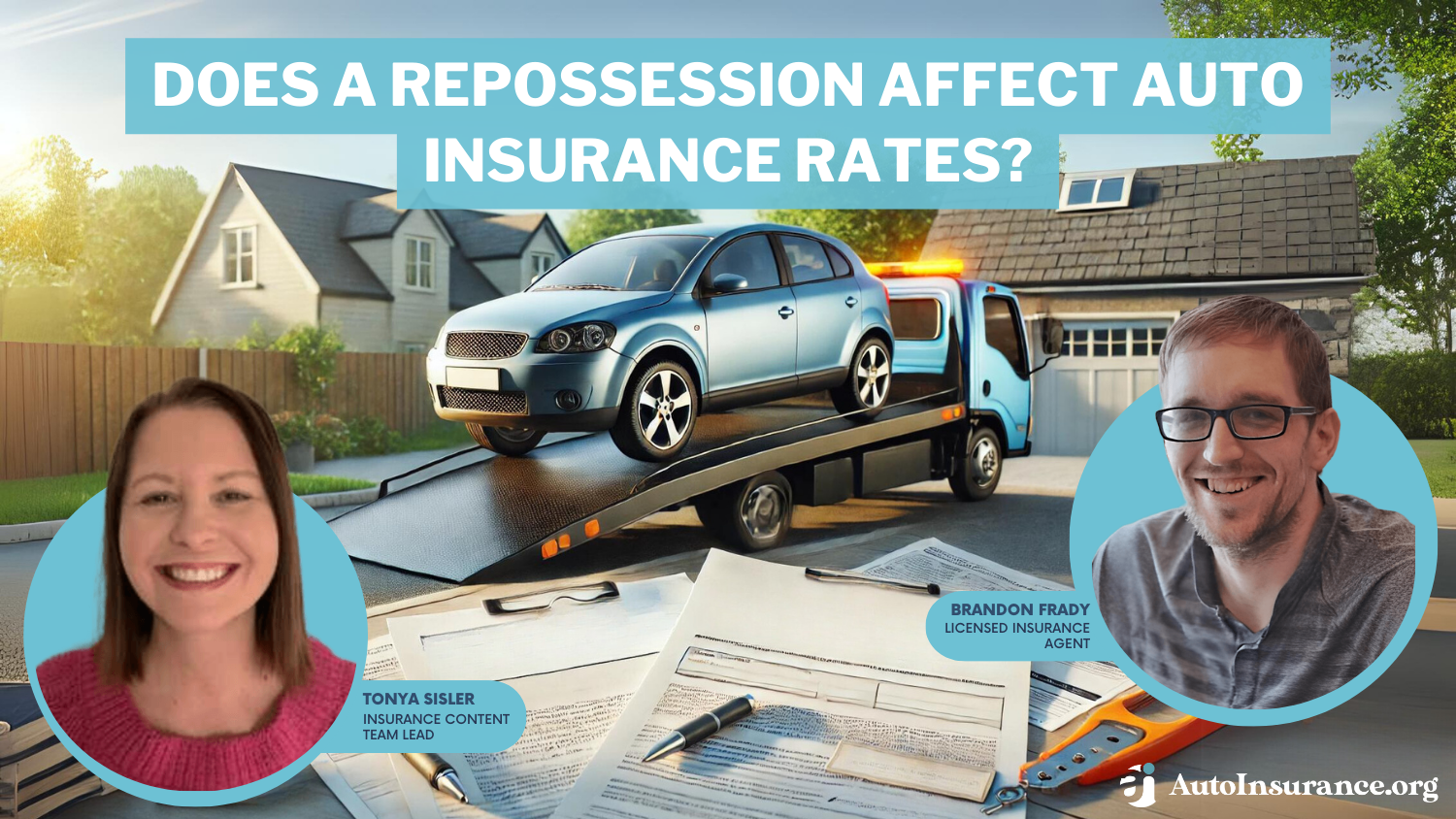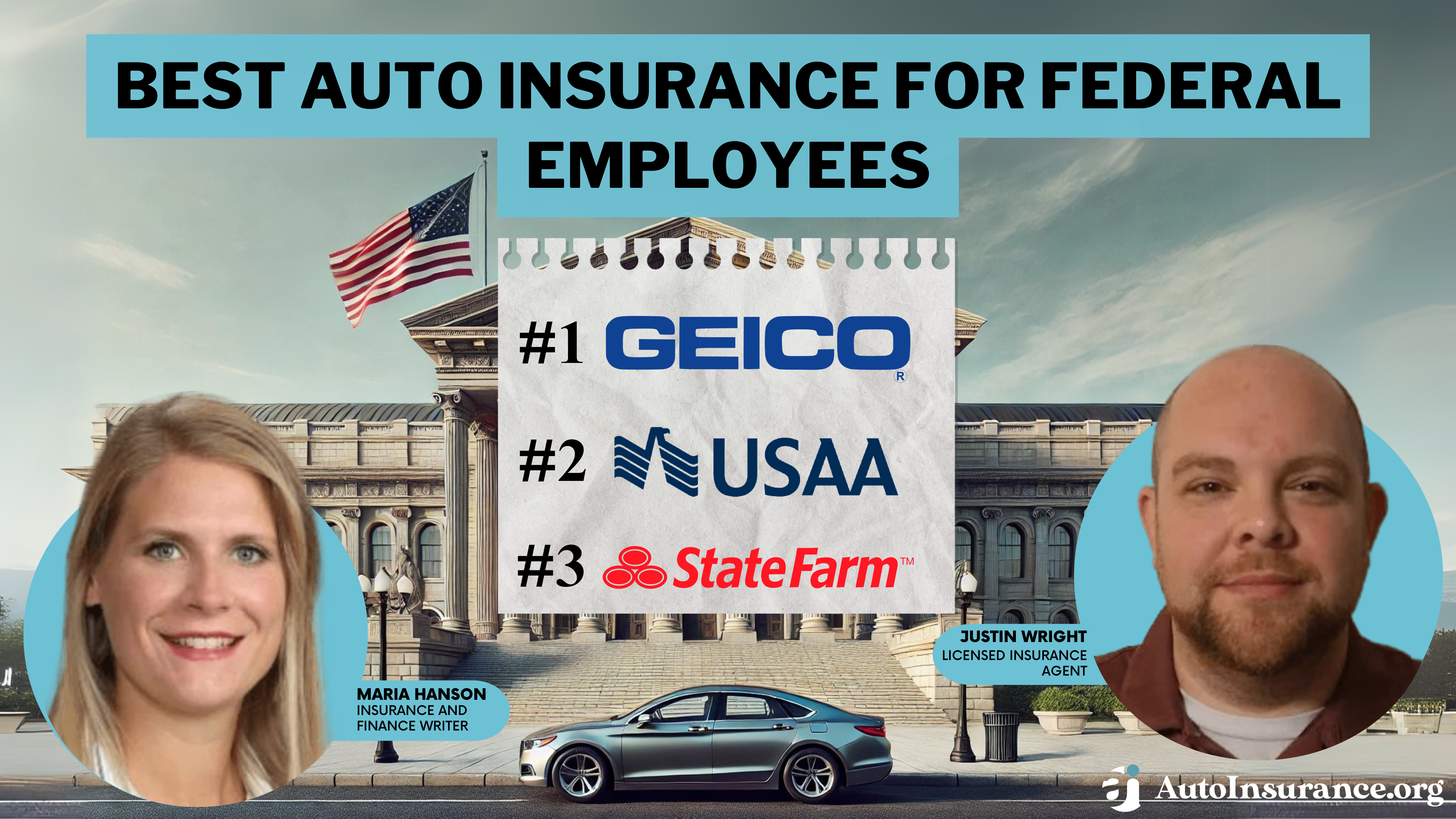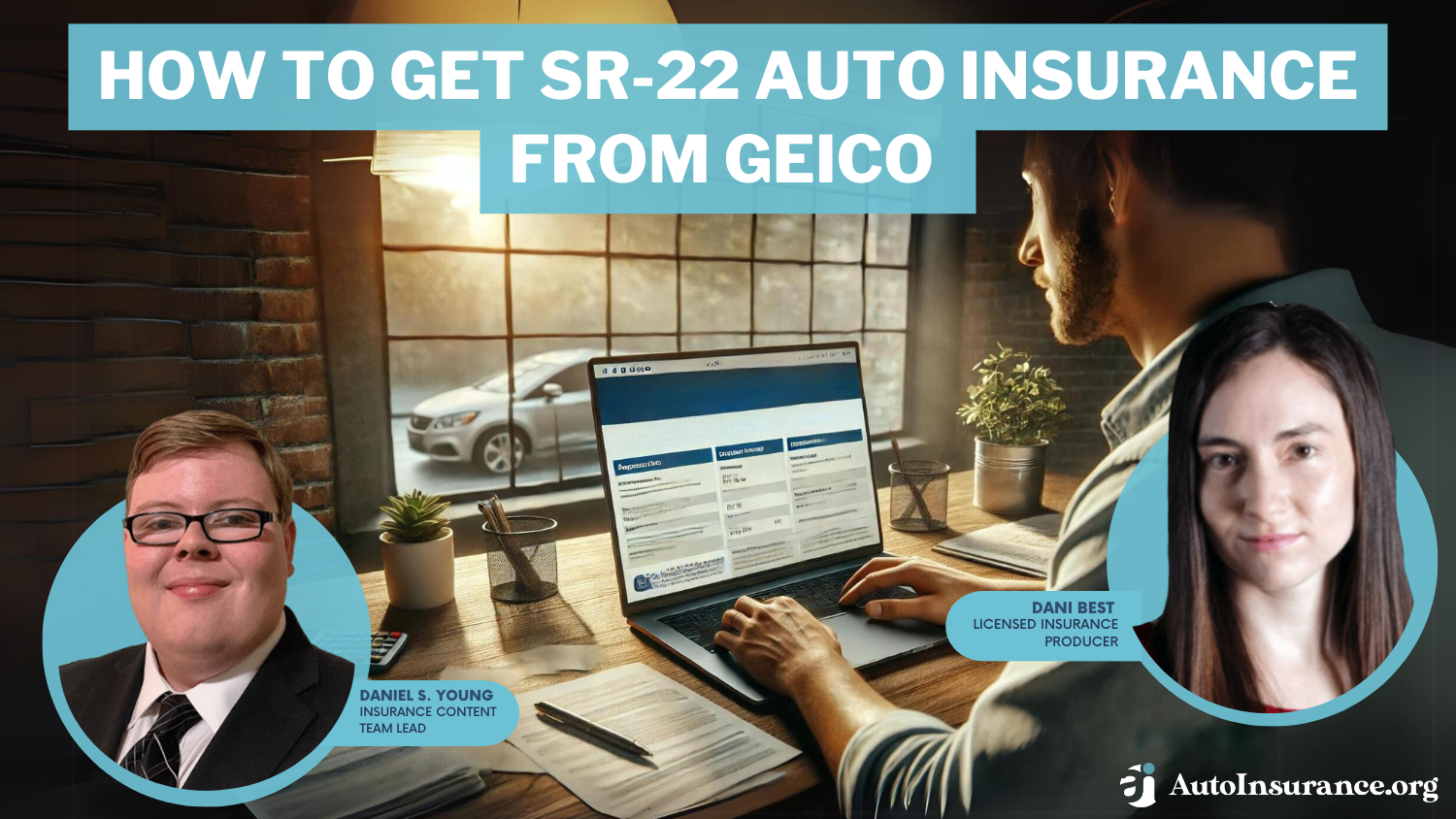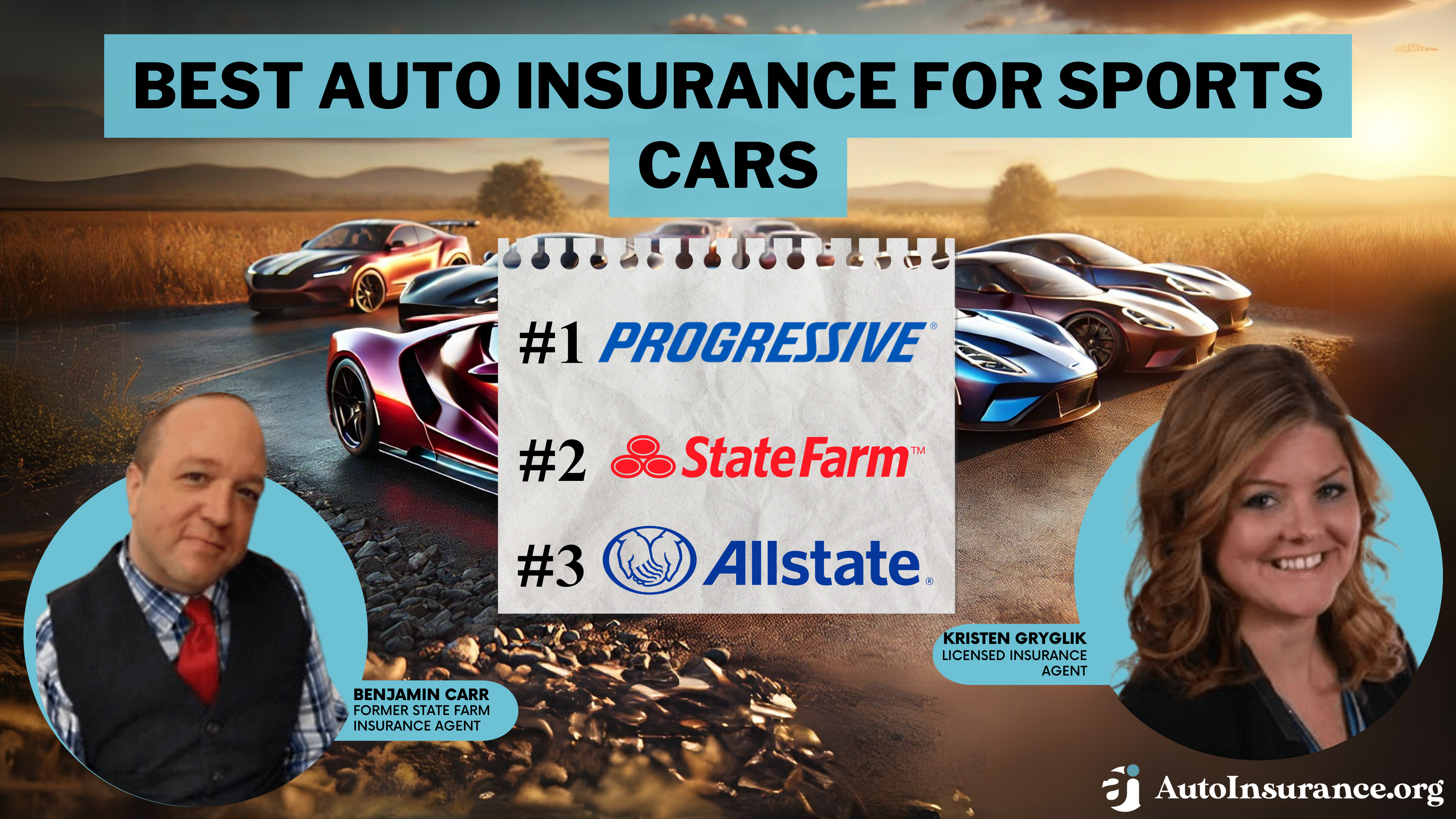Is there a limit for auto insurance rate increases? (2026)
Is there a limit for auto insurance rate increases? While regulatory oversight exists, there's no universal cap on auto insurance rate increases. They can vary by state and insurer, influenced by multiple factors like driving record and location.
Read more Secured with SHA-256 Encryption




Table of Contents
Table of Contents


Insurance & Finance Analyst
Laura Adams is one of the nation’s leading finance, insurance, and small business authorities. As an award-winning author, spokesperson, and host of the top-rated Money Girl podcast since 2008, millions of readers and listeners benefit from her practical advice. Her mission is to empower consumers to live healthy and rich lives by planning for the future and making smart money decisions. She rec...
Laura D. Adams
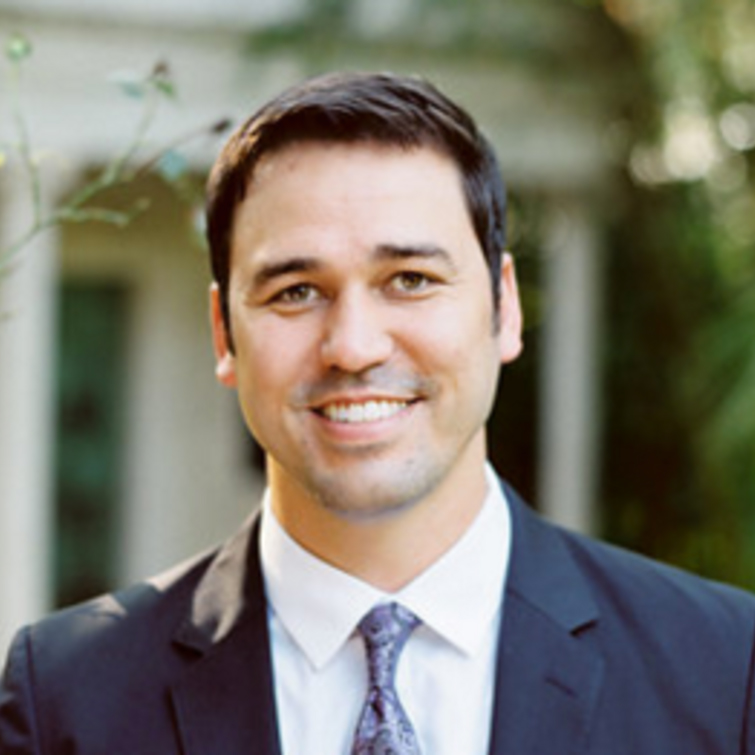

Licensed Insurance Agent
Jeff is a well-known speaker and expert in insurance and financial planning. He has spoken at top insurance conferences around the U.S., including the InsuranceNewsNet Super Conference, the 8% Nation Insurance Wealth Conference, and the Digital Life Insurance Agent Mastermind. He has been featured and quoted in Nerdwallet, Bloomberg, Forbes, U.S. News & Money, USA Today, and other leading fina...
Jeff Root
Updated December 2024
A few are beyond personal control such as an insured’s gender, age, residence, and perhaps even marital status.
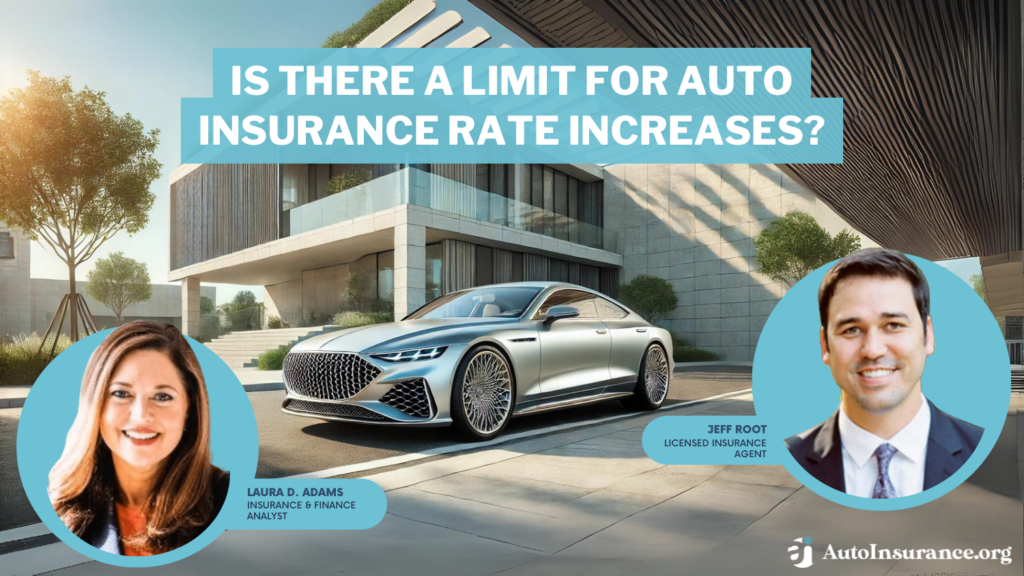
One factor that directly affects the amount of premium paid is selecting a deductible. Individuals seeking lower premiums can opt for a higher deductible. This decision plays a significant role in how insurance rates are determined. Additionally, car insurance premiums typically increase every year.
Other factors include the kind of vehicle to be insured as well as your driving history.
Click here to fill in the FREE search tool with your ZIP code and find the best auto insurance quotes!
- A variety of factors including age, residence, and driving history can impact insurance premiums
- Insurance companies must raise policy premiums to offset the economic downturn of the nation
- Compare several insurance companies before choosing one from which to purchase a policy
Rates Explained
Premiums can also be called policy payments and are the amount an individual pays to obtain an insurance policy.
Additionally, whenever a person is involved in an auto accident, the amount of premium required to be paid can increase.
Drivers ticketed for not having insurance will be targeted as greater risks requiring a higher premium payment.
In order to keep premium amounts in check, always make payments on time.
Careless drivers receiving many traffic citations such as excessive speeding, reckless driving or driving under the influence may also be subject to hefty premium increases.
Despite the reason an insurance policy premium may be increased, the insurance company can only apply higher premiums rates for a three-year maximum.
If your premium was raised due to being in an accident, if you are accident-free for the next three years, your policy premium will be decreased at the end of this period.
When considering the three-year period, it’s crucial to note that it starts counting from the date the insurance company increases the premium, not from the violation date. This emphasizes the significance of understanding, who determines the rates and costs of the insurance policy.
Free Insurance Comparison
Compare Quotes From Top Companies and Save
Secured with SHA-256 Encryption
Failure to Pay Increased Rates
What is the insurance percentage? Adding insult to injury, the insurance company compounds the issue by imposing an additional premium increase if the insured fails to pay the earlier raised premium, resulting in a lapse.
The premium will again increase, and you might be subject to being dropped by the company. Driving without insurance carries mandatory state-imposed fines, as well.
Individuals driving without insurance or following a pattern of paying late and causing coverage lapses are considered high-risk clients.
Therefore, personal driving habits and payment history also have a great impact upon how insurance companies set premium increases.
Changing insurance companies might not provide relief, as individuals with a high-risk status carry this burden regardless of the insurer they approach for coverage. This phenomenon underscores the significance of rate making in insurance.
Failure to Pay Consequence
| Consequence | Description | Measures | Process |
|---|---|---|---|
| Difficulty Obtaining New Insurance | A history of non-payment can make it more challenging to find new coverage | Seek assistance programs or state-funded insurance if needed | May share information with other insurers through databases |
| Increased Future Premiums | Cancellation can lead to higher premiums in the future due to perceived risk | Keep communication open with the insurer to negotiate terms | Record of cancellation kept in underwriting data |
| Legal & Financial Risks | Driving without insurance can result in fines, penalties, and legal issues | Explore payment plans or cheaper options | Inform state DMV of the lapse in coverage, if required by law |
| Loss of Coverage | Immediate loss of insurance coverage, leaving the driver uninsured | Review budget and adjust deductibles | Coverage lapses on the day of policy cancellation |
| Policy Cancellation | Non-payment leads to cancellation of the policy after a grace period | Set up automatic payments | Notification sent before cancellation due date |
Companies Raise Rates Consistently
Logic would seem to dictate that high gasoline prices at the pump would result in a nationwide decrease in driving.
Considering this logic, one might infer that reduced driving leads to a decrease in vehicle accidents. Consequently, insurance companies are facing fewer claims. As a result, the question arises: Is accidental damage cover necessary?
However, many companies are asking state insurance authorities for huge increases. According to Forbes Magazine online, automobile insurance rates rose 10 percent between 2008 and 2010.
Yet, just like all other industries throughout the country, the insurance industry is subject to financial demands due to the current economic downturn experienced in the United States.
Rates are going to continue to rise in the near future because of two main factors:
- Prices do naturally rise in time for any services and goods, so slight auto insurance premium increases are expected
- Secondly, no one actually can predict when the current economic crisis will end
Analysis of Consistent Rate Increases
| Factor | Description | Rates |
|---|---|---|
| High Gasoline Prices | May lead to reduced driving frequency | Expected to lower accident rates and claims |
| Actual Reduction in Driving | Reduced driving typically results in fewer vehicle accidents | Should logically decrease rates |
| Industry Financial Demands | Economic downturn pressures, operational costs, and investment losses | Pushes companies to increase rates |
| Rate Increases (2008-2010) | Despite potential for decreased claims, rates increased by 10% as reported by Forbes | Indicates other factors influencing rates |
| Prediction of Economic Recovery | Uncertainty about the end of economic downturns leads to cautious financial planning by insurance firms | Contributes to ongoing rate increases |
| Natural Price Inflation | Inflation affects all sectors, including insurance; slight increases are expected annually | Justifies regular premium increments |
Insurance Companies Need to Maximize Profits
Every insurance company management team is tasked with the chore for maximizing profits to benefit stockholders. They take a good, hard look at how Americans are affected by the current poor economy.
While more people find it difficult to afford insurance premiums, companies consistently seek methods for making profits.
Increasing premiums, within the legal limit mandated by the state is one method for creating a profitable bottom line.
The insurance industry seeks permission from states for premium increases citing several reasons validating these requests. Cost for vehicle repairs and medical treatment for motorists involved in accidents is always in the rise nationwide.
“How much is 7 years no claims worth?” Insurance companies assert that auto policy rates have remained either flat or have slightly decreased in recent years due to the standard inclusion of numerous safety features in current vehicle production.
Nationwide campaigns during the past decade focusing upon drunk drivers have had an additional impact on annual driving safety statistics.
Every company spends a lot of money on advertising claiming to have the cheapest insurance around, as well as the best service.
The best way to make sure you are billed premiums under the legal maximum is to do some comparison-shopping.
When savvy consumers obtain several insurance quotes the truth about which company has the cheapest can be answered.
Free Insurance Comparison
Compare Quotes From Top Companies and Save
Secured with SHA-256 Encryption
Understanding Auto Insurance Rate Caps
Is there a definitive cap on car insurance premiums? This is a question many policyholders ponder as they notice fluctuations in their rates. While regulatory bodies oversee insurance rate increases to ensure they are justified and fair, specific caps can vary widely depending on state regulations and individual insurance company policies. This section will explore the concept of rate caps and what controls are in place to protect consumers from unreasonable increases.
State-by-State Overview of Auto Insurance Rate Caps
| State | Rate Cap | Regulatory Body | Consumer Protections |
|---|---|---|---|
| California | Rates must be approved before implementation, focusing on fairness and not excessive profits | California Department of Insurance | Prop 103 requires prior approval and public justification of rate increases |
| Florida | No specific cap, but rates must not be excessive or unfairly discriminatory | Florida Office of Insurance Regulation | Requires filing and approval of rate increases, with opportunities for public comment |
| Michigan | Caps on certain aspects of coverage, eg, personal injury protection (PIP) | Michigan Department of Insurance and Financial Services | Strong regulatory oversight with prior approval needed for rate changes |
| New York | No specific cap, but rates must be fair and not excessively high based on risk | New York State Department of Financial Services | Must file rates for review; public can comment on proposed increases |
| Texas | No statutory cap; however, rates must be justified as reasonable and necessary | Texas Department of Insurance | Prior approval required with periodic reviews to ensure compliance with state laws |
Navigating Car Insurance Rate Increases
Every year, numerous drivers experience the perplexity of a rise in car insurance rates without a transparent grasp of the reasons behind it. This section will explore the factors contributing to the 2024 car insurance increase, examining projections and yearly adjustments. Whether stemming from alterations in driving records, shifts in coverage areas, or broader industry patterns, we’ll unravel the intricacies surrounding these adjustments. Additionally, let’s delve into how insurance averages are calculated.
Factors Contributing to Car Insurance Rates
| Factor | Description | Impact on Rates |
|---|---|---|
| Broader Industry Patterns | Trends like increased costs of repairs or higher payouts for claims | General rise in premiums industry-wide |
| Calculation of Averages | Based on pooled risk assessments, regional data, and past claims history | Averages reflect combined risk and cost factors |
| Changes in Driving Records | Accidents, traffic violations, or other incidents that mark a driver as high risk | Direct increase due to higher risk |
| Economic Inflation | Overall increase in the cost of services and goods, affecting insurance costs | Slight, consistent rise in rates |
| Regulatory Changes | New state or federal regulations requiring more coverage or higher liability limits | Potential rate increase to meet new standards |
| Shifts in Coverage Areas | Moving to a new area with different risk factors, such as higher crime rates | Rate adjustments based on regional risk |
| Technological Changes | Introduction of new technologies in vehicles leading to more expensive repairs | Increase in rates due to higher repair costs |
Annual Increases in Car Insurance Rates
Many policyholders find themselves asking, “Why does my car insurance go up every renewal?” There are several contributing factors to consistent annual rate increases, including inflation, the rising costs of vehicle repairs, and the effects of modern technology on automobiles. A thorough understanding of these elements can help policyholders better anticipate and manage their financial planning around auto insurance.
Free Insurance Comparison
Compare Quotes From Top Companies and Save
Secured with SHA-256 Encryption
Regional Variations in Auto Insurance Rate Increases
In regions like Oregon, noticeable trends in auto insurance rate increases have prompted policyholders to seek explanations. Various state-specific factors can influence these rate adjustments, such as legislative changes that affect insurance policies, environmental risks that may increase the likelihood of claims, and local accident rates. These factors help explain why insurance costs might spike more significantly in some areas than others.
Factors Influencing Car Insurance Premiums
Several key factors can drive up car insurance premiums. Individual driving records play a crucial role, as a history of accidents or traffic violations can lead to higher rates. The type of vehicle insured also impacts premiums; newer or more expensive cars typically cost more to insure. Furthermore, credit scores can significantly affect insurance rates, with lower scores generally leading to higher premiums. By understanding these factors, drivers can take proactive steps to mitigate increases in their insurance costs.
Factors Influencing Auto Insurance Rate Increases
| Factor | Description | Typical Impact on Rates |
|---|---|---|
| Age of Driver | Younger and older drivers typically face higher rates. | High |
| Change in Coverage | Adding coverage or lowering deductibles increases rates. | Moderate |
| Claims History | A history of claims can increase future premiums. | High |
| Credit Score | Lower scores can lead to higher premiums. | Moderate to High |
| Driving History | Accidents, tickets, and DUIs can significantly raise rates. | Very High |
| Location | Rates vary significantly by state and even by zip code. | High |
| Type of Vehicle | High-performance or new cars often cost more to insure. | Moderate to High |
Tackling High Renewal Quotes: Why Is My Car Insurance Renewal So High?
Receiving a high renewal quote for car insurance can be frustrating. High renewal rates can often be attributed to changes in a policyholder’s personal circumstances, such as moving to a higher-risk area or purchasing a new vehicle that is more expensive to insure. However, policyholders are not without recourse. Negotiating with insurers, shopping around for better rates, and understanding the impact of life changes on insurance premiums can help manage and potentially reduce these costs.
Free Insurance Comparison
Compare Quotes From Top Companies and Save
Secured with SHA-256 Encryption
Get Quotes for Comparison
Always solicit insurance policy quotes from at least three to five providers.
You do not want to receive quotes from too many companies since the time digesting this amount of information may be troublesome.
Three to five quotes from recommended companies should give you enough to look at and plenty from which to make a choice.
It is important when being interviewed by each insurance company that you deliver the same answers to the same questions posed by each provider.
Make sure to be consistent whether conducting this process online or by telephone.
Service is a Consideration
The focus when examining any insurance policy usually targets premium pricing. You should examine pricing comparing similar policies.
However, one area usually overlooked is the cost for customer service. It is an intangible that’s seldom considered but needs to be.
- How does a prospective company handle claims?
- Does the process demand a great deal of your personal time?
- Is there a streamlined, automated service that actually cuts down on the time spent involved in the process?
Check with the Complaint Department
Never make a policy buying decision without first checking a prospective company’s complaint handling record.
Perhaps a specific company can afford to offer low premiums far below the state legal maximum because its customer service is lousy or non-existent.
Always do a quick check with the local Better Business Bureau or the State Department of Insurance to see what types of complaints and frequencies an insurance company has experienced.
You can check the company’s financial standing by checking with A.M. Best; which rates providers. A good rating would be A+ or better.
In addition, check with J.D. Powers for a company rating compiled based upon input from both previous and current customers.
Type your ZIP code into the FREE search tool on this page to compare auto insurance quotes and policies from several companies!
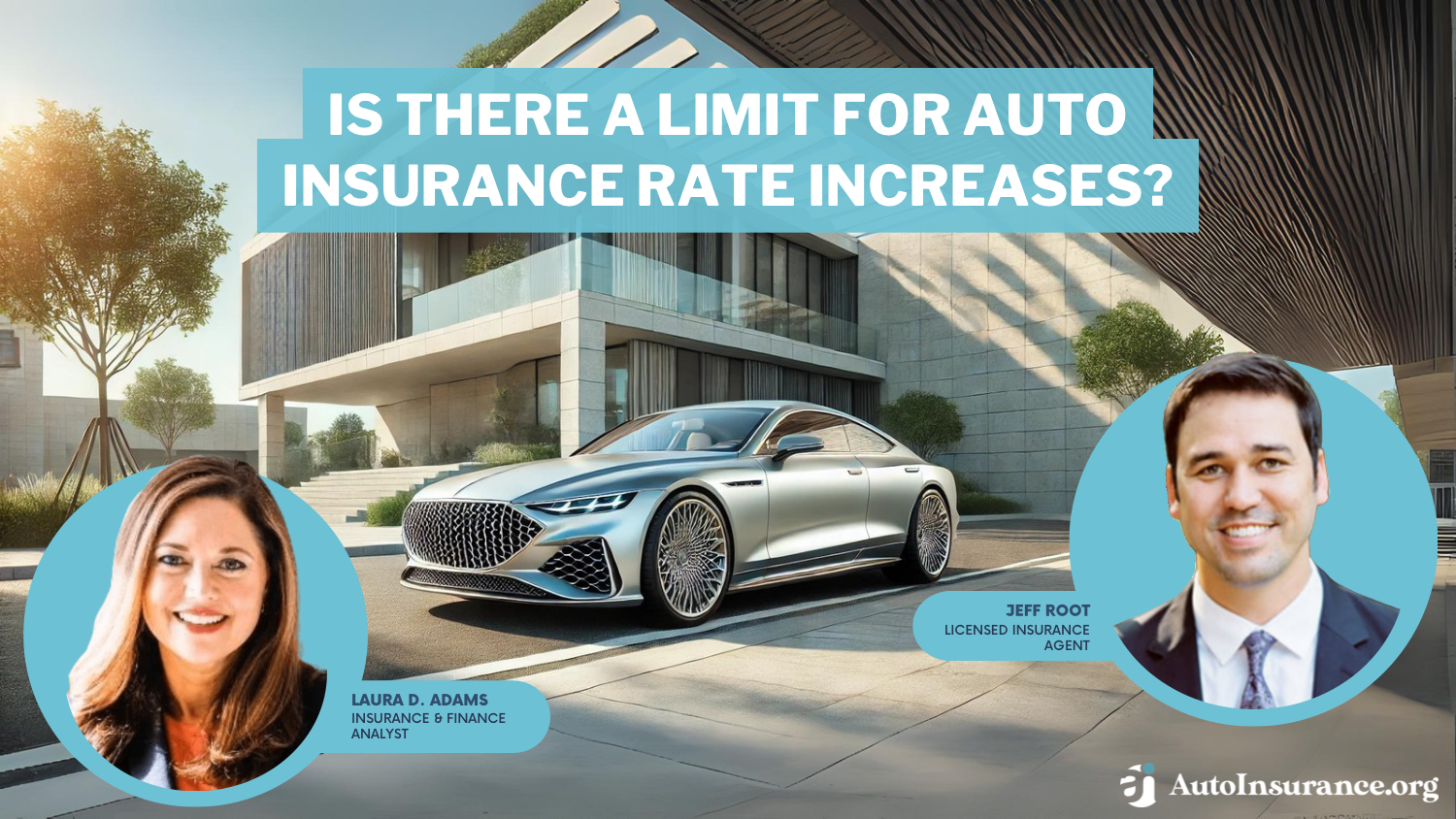
Frequently Asked Questions
Does auto insurance have a maximum it can be raised?
Yes, auto insurance typically has a maximum rate increase that insurance companies can implement. However, the specific limits and regulations regarding rate increases vary depending on the jurisdiction and local insurance laws.
What factors determine the maximum rate increase for auto insurance?
The highest permissible rise in auto insurance rates is determined by a variety of elements, encompassing state mandates, insurer guidelines, prevailing market circumstances, past claims records, and individual risk aspects like driving history, age, and geographical location. The maximum no-claims bonus varies between insurers, and it’s notable that the no-claims status may be forfeited if someone else hits me.
Are there any legal restrictions on how much auto insurance rates can be raised?
Yes, many jurisdictions have regulatory bodies that oversee the insurance industry and set guidelines for rate increases. These regulations are in place to protect consumers from excessive rate hikes and ensure fairness and affordability in the insurance market.
Can an insurance company raise my rates without any limitations?
No, insurance companies are typically subject to regulations and restrictions on rate increases. They must adhere to the guidelines set by the regulatory authorities in the jurisdiction where they operate. These regulations are designed to prevent unjustified or unreasonable rate hikes.
What are some potential pros of having a maximum rate increase for auto insurance?
- Consumer protection: Maximum rate increase limits help protect consumers from sudden and excessive premium hikes, ensuring affordability and stability in insurance costs.
- Fairness: These limits promote fairness in the insurance market by preventing insurers from imposing arbitrary or discriminatory rate increases on policyholders.
- Predictability: With a maximum rate increase, policyholders can have a clearer understanding of how their premiums may change over time, allowing for better financial planning.
What are some potential cons of having a maximum rate increase for auto insurance?
- Limited flexibility: Maximum rate increase limits may restrict insurers from adjusting rates according to changing market conditions, potentially affecting their ability to manage risks effectively.
- Reduced competitiveness: Stricter rate increase regulations could hinder competition among insurance companies, limiting their ability to offer lower rates or innovative pricing models.
- Potential for underpricing: In some cases, strict rate increase limits may discourage insurers from adequately pricing their policies, leading to potential underwriting losses or financial instability.
Is there a cap on car insurance premiums?
While some states have regulatory measures that oversee rate increases to prevent them from being unreasonable, there’s no universal cap on car insurance premiums. Rates can vary based on several factors, including the insurance company’s policies, state regulations, and the insured’s personal details.
Why do I see a car insurance rate increase at renewal time?
Insurance rates can increase at renewal for various reasons, including changes in your driving record, the addition of new claims, adjustments in coverage, or even broader factors like inflation and increased costs of repairs that affect the industry as a whole.
Why is my car insurance renewal so high this year?
Car insurance renewals can spike due to specific reasons like significant claims in your area, increased repair costs, or changes in state laws that affect insurance operations. The year 2024 might see fluctuations due to evolving market conditions or regulatory changes.
What causes a car insurance huge increase?
A significant hike in car insurance can result from accidents, traffic violations, adding a new driver to the policy, moving to a higher-risk area, or a general increase in insurance rates in the market.
How can I manage a nationwide auto insurance rate increase?
Why did Oregon auto insurance rate increase recently?
What increases car insurance premiums the most?
How much does insurance increase after a claim?
Which of the following could cause your premiums to increase?
How is the premium in an insurance policy determined?
Does a claim increase premium?
Will my insurance go up if I have protected no claims?
What does it mean when insurance premiums increase?
What is a factor that increases costs of insurance premiums?
Why do level premiums increase?
What are the factors that will determine the insurance premium?
Who calculates insurance premiums?
What is the rate in insurance?
What happens to the premium after a claim?
Does a higher premium mean higher deductible?
What is an insurance premium?
Can no claims be used on two cars?
Does a non-fault accident affect your no-claims?
Can insurance reject claims?
Why is the premium increase when a policy is renewed?
Why insurance premiums are different?
Why did my life insurance premium increase?
What determines the cost of insurance premiums?
What other factors influence the amount of a premium?
What is the insurance premium to coverage ratio?
Do premiums increase every year?
What does it mean when premium increases?
Do premiums increase with age?
What factor affects insurance premiums the most?
What two factors affect the cost of insurance premiums?
What is basic premium factor in insurance?
How is the insurance premium calculated?
Get a FREE Quote in Minutes
Insurance rates change constantly — we help you stay ahead by making it easy to compare top options and save.

